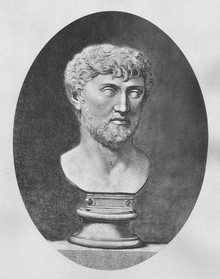Titus Lucretius Carus was a Roman poet and philosopher. His only known work is the philosophical poem De rerum natura, a didactic work about the tenets and philosophy of Epicureanism, and which usually is translated into English as On the Nature of Things and somewhat less often as On the nature of the universe. Lucretius has been credited with originating the concept of the three-age system that was formalised in 1836 by C. J. Thomsen.
Very little is known about Lucretius’s life; the only certainty is that he was either a friend or client of Gaius Memmius, to whom the poem was addressed and dedicated.
De rerum natura was a considerable influence on the Augustan poets, particularly Virgil (in his Aeneid and Georgics, and to a lesser extent on the Eclogues) and Horace. The work was almost lost during the Middle Ages, but was rediscovered in 1417 in a monastery in Germany by Poggio Bracciolini and it played an important role both in the development of atomism (Lucretius was an important influence on Pierre Gassendi) and the efforts of various figures of the Enlightenment era to construct a new Christian humanism. Lucretius’s scientific poem On the Nature of Things (c. 60 BC) has a remarkable description of Brownian motion of dust particles in verses 113–140 from Book II. He uses this as a proof of the existence of atoms.

